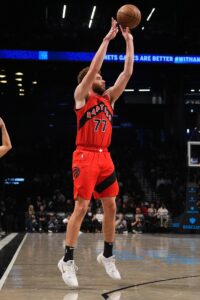At Hoops Rumors, we track virtually every kind of transaction, including free agent signings, trades, contract extensions, and many more. One form of roster move that has become increasingly common in recent years is the two-way conversion, involving a player either being converted from an Exhibit 10 contract to a two-way deal, or from a two-way deal to the standard roster.
We’re going to track all of the two-way conversions (either to or from the standard roster) in 2024/25 in the space below.
Let’s dive in…
Exhibit 10 contracts to two-way contracts:
When a player signs a contract during the offseason that includes Exhibit 10 language, he gives his new team the ability to unilaterally convert his deal into a two-way contract. The deadline to convert such a deal is the day before the season begins — this year that was Monday, October 21.
A player who signs a training camp contract that doesn’t include Exhibit 10 language could still sign a two-way deal with his club as long as his camp contract doesn’t include a guarantee exceeding $75K. However, he’d have to clear waivers before inking that new two-way contract.
Here are the players who had their Exhibit 10 contracts converted into two-way deals in 2024/25:
- Jamison Battle (Raptors) (story)

- Brandon Boston Jr. (Pelicans) (story)
- Jazian Gortman (Mavericks) (story)
- Kai Jones (Clippers) (story)
- Yuki Kawamura (Grizzlies) (story)
- E.J. Liddell (Bulls) (story)
- Tyrese Martin (Nets) (story)
- Mac McClung (Magic) (story)
- Riley Minix (Spurs) (story)
- Quincy Olivari (Lakers) (story)
- Jared Rhoden (Hornets) (story)
- Liam Robbins (Bucks) (story)
The majority of these players were invited to training camp on Exhibit 10 contracts and ultimately earned two-way slots based on their performances in camp and the preseason.
That wasn’t the case for all of them though. Boston and Rhoden were cut at the end of the preseason by the Spurs and Raptors, respectively, then were claimed off waivers by the Pelicans and Hornets and immediately converted to two-way deals just ahead of the start of the regular season.
No additional names will be added to this list for the rest of the 2024/25 season, since players can’t be converted to two-way deals after the regular season begins.
Two-way contracts to standard contracts:
A player who is on a two-way contract can have his deal unilaterally converted a one-year, minimum-salary contract by his team (or a two-year, minimum-salary contract if the player’s two-way deal covers two years, but this is rare).
Generally though, the team’s preference is to negotiate a longer-term contract with the player in order to avoid having him reach free agency at season’s end.
When converting a player from a two-way contract to the standard roster, the team can use cap room or the non-taxpayer mid-level exception to negotiate a deal of up to four years; the room exception for a deal up to three years; or the taxpayer mid-level exception, bi-annual exception, or minimum salary exception for a two-year deal.
For any contract that is worth more than the minimum or exceeds the number of years left on the player’s two-way pact, the player must agree to the terms — a team can’t complete that sort of deal unilaterally.
Here are the players who have been converted from two-way deals to standard contracts so far in 2024/25, along with the terms of their new contracts, in chronological order:
- Scotty Pippen Jr. (Grizzlies): Four years, minimum salary (story). First two years fully guaranteed. Third year partially guaranteed ($350K). Fourth-year team option. Signed using non-taxpayer mid-level exception.
- Jay Huff (Grizzlies): Exact details TBD (story). First two years fully guaranteed. Third year partially guaranteed. Fourth-year team option. Signed using non-taxpayer mid-level exception.
Players on two-way contracts can be converted to standard deals until the last day of the regular season, so this list will continue to grow until mid-April.

 However, according to Blake Murphy of Sportsnet.ca (
However, according to Blake Murphy of Sportsnet.ca (